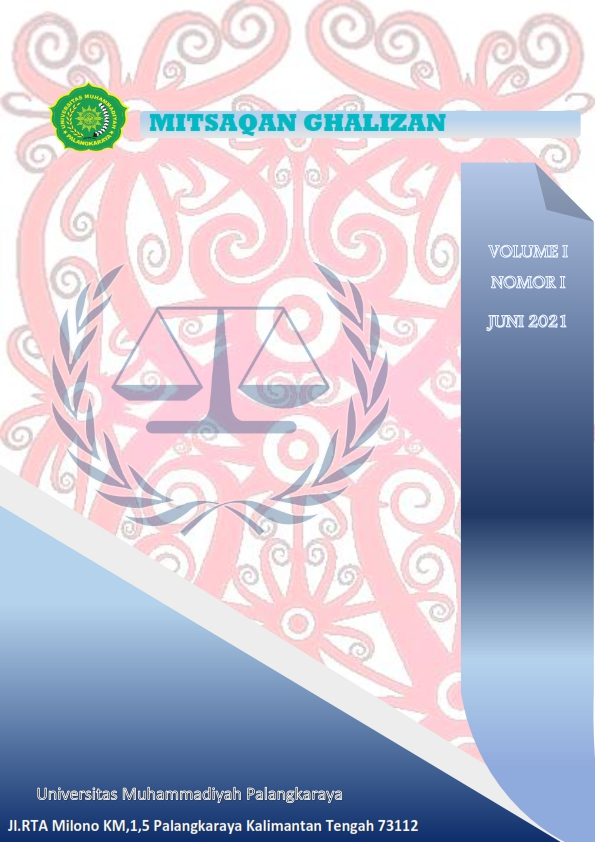HUBUNGAN DALAM PERNIKAHAN JARAK JAUH MENURUT HUKUM ISLAM
Main Article Content
Abstract
Long distance relationship or called Long Distance Relationship is a relationship where the couple is separated by physical distance and it is not possible to meet. Opportunities to communicate are very limited in the individual view of each partner who undergoes, The condition of couples who undergo long-distance marriage relationships, married couples will usually experience a crisis in their proximity due to their different geographical distances and locations. Factors that cause couples to undergo long-distance relationships are work factors and educational factors. In undergoing a long-distance marital relationship will affect the conflict. Conflict can arise due to personal sources, physical sources, sources of interpersonal relationships, and environmental sources. Commitment is something that makes someone want to be attached to something or someone and be with him until the end of the journey. Commitments made to be agreed upon in marriage in order to help married couples stay in harmony in building a harmonious family.
This study intends to examine more deeply about Long Distance Marriage according to Islamic law and how to study the law through the Qur'an, Hadith and solutions. The research was conducted using research methods. Library research is a series of activities related to the methods of collecting library data, reading and taking notes and processing research materials. this is a study that utilizes library resources to obtain research data. namely research that intends to be experienced regarding a social reality by describing a number of data results studied between the phenomena tested in order to gain in-depth understanding, develop theories, describe those that trace references in the printed and electronic Islamic world about long-distance marriage according to Islamic law.
The results of the study state that long-distance marriage relationships in Islamic law are allowed as long as husband and wife who undergo it are equally sincere and do not violate Islamic law and the process. According to Quraish Shihab, marriage is husband and wife who should accompany each other physically and mentally, marriage is together physically, mentally, mentally, and so on, that's why the physical separation is not fully appropriate. In Islam there is a rule of taklik talak which falls on certain conditions or hanging divorce. One thing that is emphasized is that if the husband leaves his wife within a period of months/years (according to the agreement) and the wife is not willing, it will result in divorce. This means that the willingness of both parties is the most important point before undergoing a long-distance marriage.
Downloads
Article Details
References
Bachtiar, A. (2004). Menikahlah, maka engkau akan bahagia. Yogyakarta: Saujana.
DeGenova, M. K. (2005). Intimate relationships, marriages & families (6th ed.). New York: McGraw Hill.
Dewi, K. S. (2012). Buku ajar kesehatan mental. Semarang: UPT UNDIP Press Semarang.
Ervika, E. (2005). Kelekatan (Attachment) Pada Anak. Skripsi. Program Sarjana Universitas Sumatra Utara Medan.
Hatfield, E., & Rapson, R. (2005). Love and sex: Cross-cultural perspectives. Needham Heights MA: Allyn & Bacon.
Jimenez, M. F. (2010). The regulation of psychological distance in long-distance relationships. Dissertation. zur Erlangung des akademischen Grades doctor rerum naturalium im Fach Psychologie.
Johnson, M. (1999). The tripartite nature of marital commitment: Personal, moral, and structural reasons to stay married. Jounal of Marriage and The Family, 61(1), 160-171.
Lestari, S. (2012). Psikologi keluarga. Jakarta: Kencana.
Mangunsong, F. (2011). Psikologi dan pendidikan anak berkebutuhan khusus. Depok: Lembaga Pengembangan Sarana Pengukuran dan Pendidikan Psikologi (LPSP3) Kampus Baru UI.
Miller, R., & Perlman, D. (2009). Intimate relationship (5th ed.). New York: McGraw-Hill.
Papalia, E. D., Olds, W. S., &Feldman, D. R. (2005). Human development. New York: Mc. Graw
Hill.
Qomariyah, N. (2015). Gambaran pernikahan jarak jauh (long distance marriage). Skripsi. Program Sarjana Universitas Islam Negeri Sunan Kalijaga Yogyakarta.
Santrock. (2009). Psikologi pendidikan (2nd ed.). Jakarta: Salemba Humanika.
Satiadarma, M. P. (2001). Menyikapi perselingkuhan. Jakarta: Pustaka Populer Obor.
Smith, J. A. (2009). Psikologi kualitatif: Panduan praktis metode riset. Yogyakarta: Pustaka Belajar.
Sternberg, R. J. (1998). Love is story: A new theory of relationship. New York: Oxford University Press.
Sternberg, R. J. (2010). Cupid arrow: Konsepsi cinta dari zaman ke zaman. Yogyakarta: Pustaka Pelajar.
Sugeng. I. (2005). Pengasuhan anak dalam keluarga; the next lost generations. Semarang: Andi.
Suraji, I. (2013). Akhlak dalam kehidupan berkeluarga. Diunduh dari http: id.portalgaruda.org.
Kementerian Agama RI,Al-Quran dan Terjemahannya,(Jakarta: LenteraAbadi)2010.
Ariyadi, Ariyadi. "Tindak Pidana Pelaku Eksploitasi Seksual pada Anak Menurut Hukum Islam." Jurnal Hadratul Madaniyah 6.1 (2019)
